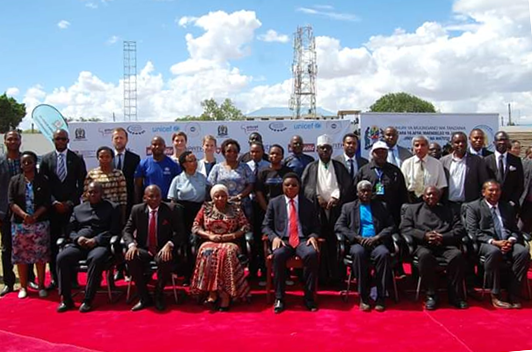World Health Organization
From Mandate to Implementation: Operationalizing National Multisectoral Governance for NCDs in Kuwait
Multisectoral Action
17 Dec 2025
World Health Organization | 12 Sep 2023
In Tanzania, the national NCD Program leverages multisectoral government support and close collaboration with civil society organizations to raise community awareness and build capacity for NCD prevention and control at the primary care level. A particular focus is on improving the diagnosis and management of diabetes and hypertension.
Among cancer, cardiovascular, chronic respiratory, and other noncommunicable diseases, diabetes poses a growing health challenge in Tanzania. Some 9% of people aged 20 to 79 are reportedly affected, yet only a third of people living with diabetes are diagnosed early, increasing the risk of renal, eye or neurological complications. Adding an economic burden to these health issues, households with limited resources can incur high out-of-pocket health expenditures and suffer severe financial problems.
“Early diabetes diagnosis and management is a challenge across community, primary health care and national policy levels,” said Prof. Kaushik Ramaiya, an endocrinologist leading the Tanzania Diabetes Association. “There is only limited awareness about the negative health impacts of smoking, physical inactivity, or an unhealthy diet, and health professionals need to be better trained to early diagnose people living with diabetes”, he explained.
Since the early 2000s, Tanzania has been coordinating efforts to address NCDs across multiple government departments. Under the leadership of the Prime Minister’s Office, the disaster management department coordinates the multisectoral National NCD Programme and the National Diabetes Control Programme (NDCP) with close support from the Ministry of Health and other government departments.
To improve diabetes diagnosis and management, the Ministry of Health and the Prime Minister’s Office Regional & Local Government (PORALG) chose the Tanzania Diabetes Association and the Tanzania NCD Alliance as implementing partners of the NCD Program for its roll-out at both national and local levels.
In 2019, the Ministry of Health initiated a yearly National NCD Week, coinciding with World Diabetes Day on 14 November. On the same day, the Hon Prime Minister of the United Republic of Tanzania, Hon Kassim Majaliwa, launched the National NCD Program with an explicitly cross-sectoral and multistakeholder approach to diabetes management and prevention.
As part of the new National NCD Programme, the Tanzania Diabetes Association convenes a yearly multi-sectoral steering meeting in charge of strategic and policy aspects, as well as a quarterly programme implementation committee that addresses bottlenecks and potential solutions. Focal persons specialising in health in all policies have been placed in multiple government agencies, and the Ministry of Finance and Planning has recently initiated a reporting system requiring institutions to account for actions taken on diabetes and other NCDs.
"The yearly NCD week and the prime minister’s endorsement of the National NCD programme directly support our longstanding efforts to raise community awareness and train health professionals on preventing, diagnosing and managing diabetes early. Through the multisectoral steering and implementation committees, we are able to effectively engage government partners and introduce changes at the primary care level, for example when a new curriculum or a new protocol of care is available and requires regulatory approval."
- Prof. Kaushik Ramaiya, Tanzania Diabetes Association -
The yearly NCD week and the prime minister’s endorsement of the National NCD programme directly support our longstanding efforts to raise community awareness and train health professionals on preventing, diagnosing and managing diabetes early”, said Prof. Kaushik. “Through the steering and implementation committees, we are able to effectively engage government partners and introduce changes at the primary care level, for example when a new curriculum or a new protocol of care is available and requires regulatory approval”, he added.

Since its inauguration in 2019, the NCD week is also accompanied by a national NCD Scientific Conference, sourcing interdisciplinary research findings and evidence on tackling NCDs from all over the country. In some regions, government officials are now promoting health checks for everyone over 40, and health workers all across Tanzania receive training on better detecting NCDs, including in specialized health facilities such as HIV/AIDS and tuberculosis centres.
With Tanzania’s National NCD Programme still in its formative stage, the multisectoral and multistakeholder initiatives to improve diabetes diagnosis and management pave the way for action to tackle other NCDs. “A lot still needs to be done to effectively engage decision-makers in non-health departments and make sure everyone has a seat at the national decision-making table. Yet our interdisciplinary team of government institutions and local and international implementation partners gives us a strong ground from which we continue to tackle NCDs in Tanzania”, Prof. Kaushik concluded.
This feature story is part of a series compiling country experiences in leveraging multisectoral action for improved NCD and mental health policies and programmes. Read more on the key role of whole-of-government-approaches to tackle NCDs and mental health conditions in the global mapping report, or visit the digital repository on multisectoral action to explore further country experiences.
This country story is also available as a detailed country case study in the WHO Compendium report on multisectoral actions for the prevention and control of noncommunicable diseases and mental health conditions. Read the full report or directly access the country story via below link.